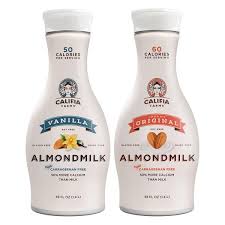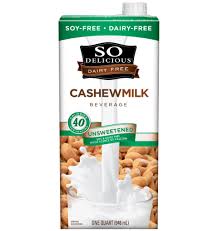The Vegetarian Resource Group’s Guide to Nut and Seed Milks 2019

Choose almost any nut and you’ll find a plant milk made with it – from almonds to pecans. And then there are milks based on seeds like sesame, flax, and hemp.
There are so many, many kinds of nut and seed milks. Thanks to VRG intern Laneece Hurd who collected and organized information so that it’s not overwhelming. To see detailed information about everything from the number of calories to how much vitamin B12 is added, to which sweeteners are used in many brands of nut and seed milks available in the U.S., go to this helpful table https://www.vrg.org/nutrition/milk_alternatives/nut_and_seed_milk_table.pdf
Generally speaking, nut and seed milks have 25-200 calories in an 8-ounce serving. Sweetened milks tend to have more calories than unsweetened milks. Nut and seed milks are frequently lower in protein than soy or pea protein-based milk unless additional protein is added. Most brands have 1 gram of protein in a serving.

Many of the milks we looked at have vitamin D, calcium, and vitamin B12 added although some products are not enriched and not all contain all three of these nutrients. If you’re relying on plant milks as sources of calcium, vitamin B12, or vitamin D, be sure to check the product label.
You may also be interested in information on soy milk, coconut milk, and grain and pea milks.
See: https://www.vrg.org/nutrition/milk_alternatives/index.htm
For information about VRG internships, see https://www.vrg.org/student/index.php
To support The Vegetarian Resource Group research, donate at www.vrg.org/donate
The contents of this posting, our website, and our other publications, including Vegetarian Journal, are not intended to provide personal medical advice. Medical advice should be obtained from a qualified health professional. We often depend on product and ingredient information from company statements. It is impossible to be 100% sure about a statement, info can change, people have different views, and mistakes can be made. Please use your best judgment about whether a product is suitable for you. To be sure, do further research or confirmation on your own.
